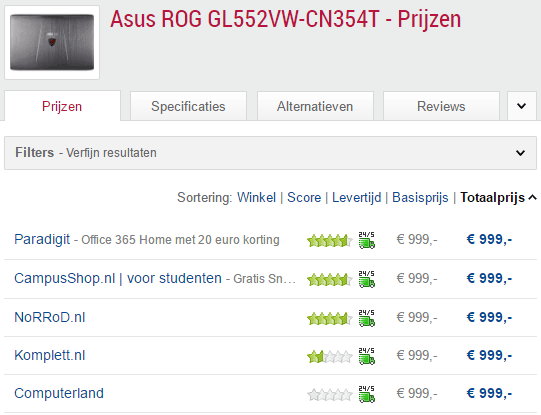In the EU the European Commission starts an investigation into suspected anti-competitive practices in e-commerce. As it seems a familiar name has surfaced ASUS but also includes Denon & Marantz, Philips and Pioneer. In another investigation Valve is being looked into as well.
The investigation is focused on etail web-stores where the companies allegedly have fixed prices with these shops, this is illegal in the EU in order to keep prices competitive, fair and open. Not a lot of information has been given in the EU document. As the press release explains, the Commission believes the companies may have broken competition rules by stopping online retailers in Europe from setting their own prices for products including household appliances, laptops and hi-fi equipment. Historically the fines from the European Commission can be extremely hurtful if ruled right.
Interesting however also is that VALVE and its related publishers are topic of investigation. That investigation concerns geo-blocking practices, where companies prevent consumers from purchasing digital content, in this case PC video games, because of the consumer's location or country of residence. The EC is investigating if bilateral agreements between Valve and the video games publishers restrict trade within the Single Market by preventing consumers buying cheaper versions of games in other member states.
Below a paste of the total investigation:
---
Antitrust: Commission opens three investigations into suspected anticompetitive practices in e-commerce
Brussels, 2 February 2017
The European Commission has launched three separate investigations to assess if certain online sales practices prevent, in breach of EU antitrust rules, consumers from enjoying cross-border choice and being able to buy consumer electronics, video games and hotel accommodation at competitive prices.
Commissioner Margrethe Vestager, in charge of competition policy said: "E-commerce should give consumers a wider choice of goods and services, as well as the opportunity to make purchases across borders. The three investigations we have opened today focus on practices where we suspect companies are trying to deny these benefits for consumers. The cases concern the consumer electronics, video games and hotel accommodation sectors. More specifically, we are looking into whether these companies are breaking EU competition rules by unfairly restricting retail prices or by excluding customers from certain offers because of their nationality or location."
Although more and more goods and services are traded over the internet worldwide, cross-border online sales within the EU are only growing slowly. The Commission's Digital Single Market Strategy identifies a number of regulatory barriers that hinder cross-border e-commerce and proposes different initiatives to address these.
However, there are also indications that businesses may themselves establish barriers to cross-border online trade, with a view to fragmenting the EU's Single Market along national borders and preventing competition. The Commission has therefore launched an inquiry to gather market information in order to better understand the nature, prevalence and effects of these barriers and to assess them in light of EU antitrust rules.
The three investigations opened today by the Commission aim to tackle the specific issues of retail price restrictions, discrimination on the basis of location and geo-blocking. The preliminary results of the Commission's competition sector inquiry on e-commerce show that the use of these restrictions is widespread throughout the EU.
Under certain circumstances, these practices may make cross-border shopping or online shopping in general more difficult and ultimately harm consumers by preventing them from benefiting from greater choice and lower prices in e-commerce. Such behaviour may breach EU competition rules that prohibit anti-competitive agreements between companies (Article 101 of the Treaty on the Functioning of the European Union - TFEU).
Consumer electronics manufacturers
The Commission is investigating whether Asus, Denon & Marantz, Philips and Pioneer have breached EU competition rules by restricting the ability of online retailers to set their own prices for widely used consumer electronics products such as household appliances, notebooks and hi-fi products.
The effect of these suspected price restrictions may be aggravated due to the use by many online retailers of pricing software that automatically adapts retail prices to those of leading competitors. As a result, the alleged behaviour may have had a broader impact on overall online prices for the respective consumer electronics products.
The Commission is carrying out this in-depth investigation on its own initiative.
Video games
The Commission is investigating bilateral agreements concluded between Valve Corporation, owner of the Steam game distribution platform, and five PC video game publishers, Bandai Namco, Capcom, Focus Home, Koch Media and ZeniMax. The investigation concerns geo-blocking practices, where companies prevent consumers from purchasing digital content, in this case PC video games, because of the consumer's location or country of residence.
After the purchase of certain PC video games users need to confirm that their copy of the game is not pirated to be able to play it. This is done with an "activation key" on Valve's game distribution platform, Steam. This system is applied for a wide range of games, including sports, simulation and action games.
The investigation focuses on whether the agreements in question require or have required the use of activation keys for the purpose of geo-blocking. In particular, an "activation key" can grant access to a purchased game only to consumers in a particular EU Member State (for example the Czech Republic or Poland). This may amount to a breach of EU competition rules by reducing cross-border competition as a result of restricting so-called "parallel trade" within the Single Market and preventing consumers from buying cheaper games that may be available in other Member States.
The Commission is carrying out this in-depth investigation on its own initiative.
Background
Article 101 TFEU prohibits agreements between undertakings and decisions of associations of undertakings that prevent, restrict or distort competition within the EU's Single Market.
The opening of formal proceedings does not prejudge the outcome of the investigation. It relieves the competition authorities of EU Member States of their competence to apply EU competition rules to the practices concerned.
There is no legal deadline for bringing an antitrust investigation to an end. The duration of an investigation depends on a number of factors, including the complexity of the case, the cooperation of the companies with the Commission and the exercise of the rights of defence.


